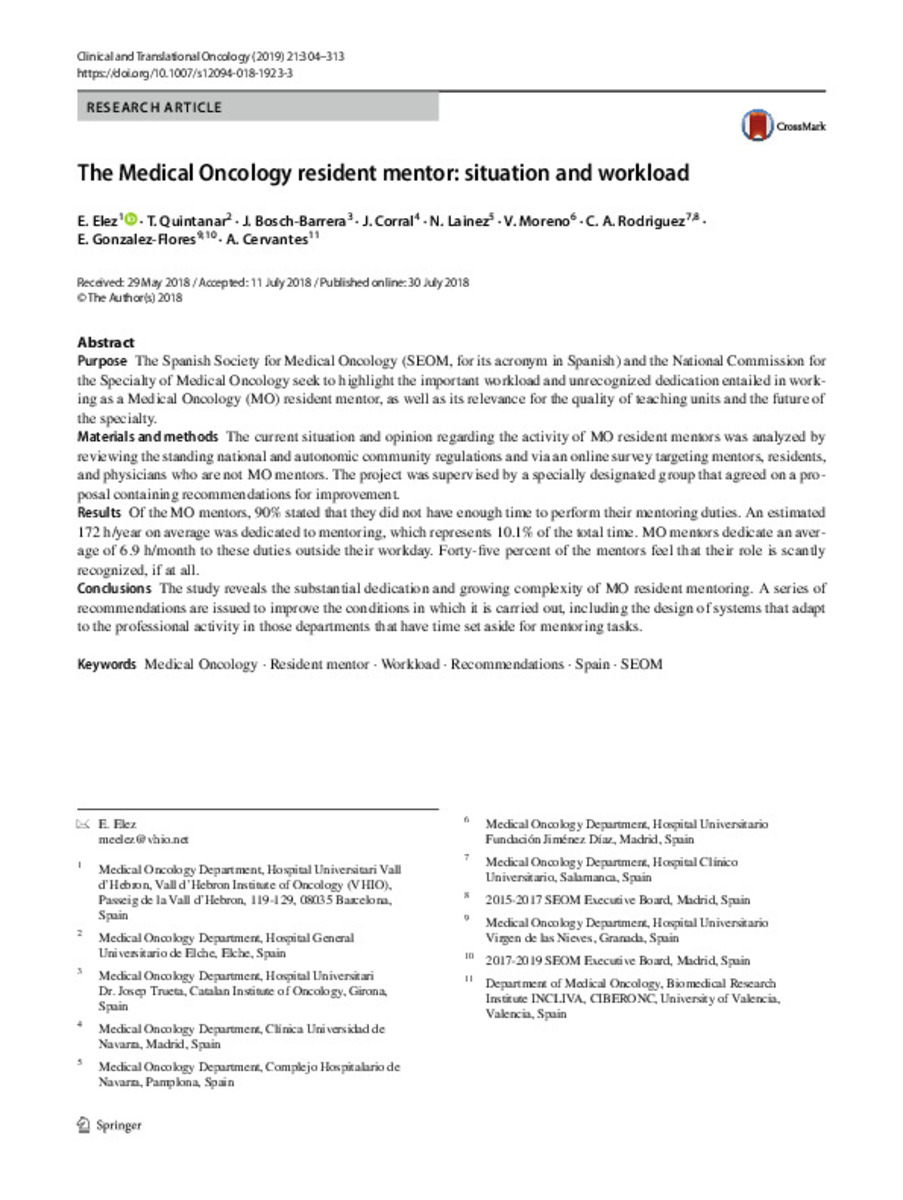Full metadata record
| DC Field | Value | Language |
|---|---|---|
| dc.creator | Elez, E. (E.) | - |
| dc.creator | Quintanar-Verdúguez, T. (T.) | - |
| dc.creator | Bosch-Barrera, J. (Joaquim) | - |
| dc.creator | Corral, J. (J.) | - |
| dc.creator | Lainez, N. (N.) | - |
| dc.creator | Moreno, V. (V.) | - |
| dc.creator | Rodríguez, C.A. (C.A.) | - |
| dc.creator | González-Flores, E. (E.) | - |
| dc.creator | Cervantes, A. (Andrés) | - |
| dc.date.accessioned | 2021-09-20T08:25:31Z | - |
| dc.date.available | 2021-09-20T08:25:31Z | - |
| dc.date.issued | 2019 | - |
| dc.identifier.citation | Elez, E. (E.); Quintanar-Verdúguez, T. (T.); Bosch-Barrera, J. (Joaquim); et al. "The Medical Oncology resident mentor: situation and workload". Clinical and Translational Oncology. 21, 2019, 304 - 313 | es |
| dc.identifier.issn | 1699-048X | - |
| dc.identifier.other | PMID: 30062521 | - |
| dc.identifier.uri | https://hdl.handle.net/10171/62021 | - |
| dc.description.abstract | Purpose: The Spanish Society for Medical Oncology (SEOM, for its acronym in Spanish) and the National Commission for the Specialty of Medical Oncology seek to highlight the important workload and unrecognized dedication entailed in working as a Medical Oncology (MO) resident mentor, as well as its relevance for the quality of teaching units and the future of the specialty. Materials and methods: The current situation and opinion regarding the activity of MO resident mentors was analyzed by reviewing the standing national and autonomic community regulations and via an online survey targeting mentors, residents, and physicians who are not MO mentors. The project was supervised by a specially designated group that agreed on a proposal containing recommendations for improvement. Results: Of the MO mentors, 90% stated that they did not have enough time to perform their mentoring duties. An estimated 172 h/year on average was dedicated to mentoring, which represents 10.1% of the total time. MO mentors dedicate an average of 6.9 h/month to these duties outside their workday. Forty-five percent of the mentors feel that their role is scantly recognized, if at all. Conclusions: The study reveals the substantial dedication and growing complexity of MO resident mentoring. A series of recommendations are issued to improve the conditions in which it is carried out, including the design of systems that adapt to the professional activity in those departments that have time set aside for mentoring tasks. | es_ES |
| dc.description.sponsorship | This study was funded as an unrestricted grant by Servier. Servier did not have any intervention in the discussion and outcomes of this report. | es_ES |
| dc.language.iso | eng | es_ES |
| dc.publisher | Springer Science and Business Media LLC | es_ES |
| dc.rights | info:eu-repo/semantics/openAccess | es_ES |
| dc.subject | Materias Investigacion::Ciencias de la Salud::Oncología | es_ES |
| dc.subject | Medical Oncology | es_ES |
| dc.subject | Recommendations | es_ES |
| dc.subject | Resident mentor | es_ES |
| dc.subject | SEOM | es_ES |
| dc.subject | Spain | es_ES |
| dc.subject | Workload | es_ES |
| dc.title | The Medical Oncology resident mentor: situation and workload | es_ES |
| dc.type | info:eu-repo/semantics/article | es_ES |
| dc.description.note | This article is distributed under the terms of the Creative Commons Attribution 4.0 International License (http://creativecommons.org/licenses/by/4.0/), which permits unrestricted use, distribution, and reproduction in any medium, provided you give appropriate credit to the original author(s) and the source, provide a link to the Creative Commons license, and indicate if changes were made. | es_ES |
| dc.identifier.doi | 10.1007/s12094-018-1923-3 | - |
| dadun.citation.endingPage | 313 | es_ES |
| dadun.citation.publicationName | Clinical and Translational Oncology | es_ES |
| dadun.citation.startingPage | 304 | es_ES |
| dadun.citation.volume | 21 | es_ES |
Files in This Item:
Statistics and impact
Items in Dadun are protected by copyright, with all rights reserved, unless otherwise indicated.






